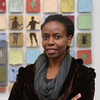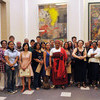Third PanSALB chairpersonship term for UCT prof
01 April 2025 | Story Myolisi Gophe. Photo Supplied. Read time 4 min.
Professor Lolie Makhubu-Badenhorst’s re-election as the chairperson of the Pan South African Language Board (PanSALB) for a third term brings promising prospects for the country.
Professor Makhubu-Badenhorst’s prior track record in the position is marked by significant strides in promoting and safeguarding indigenous languages. At a time when South Africa grapples with the implementation of language policies – not only in public institutions but also across private companies and broader society – her expertise is indispensable, 30 years into the nation’s democracy.
Makhubu-Badenhorst, the director of the Multilingualism Education Project (MEP) in the Centre for Higher Education Development (CHED) at the University of Cape Town (UCT), was elected on Monday, 24 March, to serve a two-year term, renewable for one additional year. She is part of a 15-member board appointed in February by Minister of Sport, Arts, and Culture Gayton McKenzie for a five-year period. Among her fellow board members is UCT PhD candidate Naledi Maponopono.
The PanSALB board reports directly to the minister and the Portfolio Committee on Sport, Arts and Culture, ensuring that language-related policies align with South Africa’s constitutional mandate of multilingualism. Its primary role is to advise Parliament and oversee the implementation of robust, inclusive language policies.
“I am humbled by the opportunity to lead PanSALB at this critical time.”
“I am humbled by the opportunity to lead PanSALB at this critical time,” Makhubu-Badenhorst said. “The minister and my colleagues have recognised the talent coming from this institution. For me, this means that UCT continues to produce some of the best minds in the country. UCT is already leading the continent in academic matters, and now we are at the forefront of shaping language policy at a national level.”
During her earlier terms, Makhubu-Badenhorst was instrumental in securing official recognition of the South African Sign Language (SASL). “Now that SASL has been granted official status, we must ensure that its implementation is taken seriously. Out of the 26 public universities in South Africa, only a few adequately support Deaf students. This needs to change. We must ensure that institutions have the necessary resources, such as interpreters and teaching materials, to support Deaf students in higher education. The recognition of SASL must translate into real, tangible benefits for the Deaf community. We cannot allow it to be merely a legal declaration without real impact on people’s lives.”
Protecting indigenous languages
According to Makhubu-Badenhorst, one of the major priorities of the board is the promotion and protection of indigenous languages, including Khoisan languages, which remain unrecognised as official languages. “In 2023, we confirmed an honorary degree for the only living speaker of the N|uu language, Dr Ouma Katrina [Esau]. When you look at the South African coat of arms, Khoisan languages are represented, yet none of them have official status. My vision is to change that and ensure that our language policies are not just symbolic but effectively implemented.”
She further emphasised the urgency of preserving indigenous languages. “Failure to act now risks their extinction, along with the rich cultural heritage they represent. Language is the foundation of social cohesion and cultural identity.”
Engage with initiatives
Makhubu-Badenhorst also encouraged South Africans to engage with PanSALB’s initiatives. “I urge all citizens to follow our work and contribute to discussions on language policy. Our mandate is transparent, and we operate independently, without fear or favour. PanSALB is not merely a regulatory body – we are the custodians of South Africa’s linguistic diversity. Our work ensures that future generations can speak, write, and live in their indigenous languages with pride.”
“If we do not take urgent steps to implement meaningful language policies, these languages will disappear.”
She emphasised that the survival of indigenous languages is a national priority, adding that failure to act now could result in their extinction. “If we do not take urgent steps to implement meaningful language policies, these languages will disappear.”
 This work is licensed under a Creative Commons Attribution-NoDerivatives 4.0 International License.
This work is licensed under a Creative Commons Attribution-NoDerivatives 4.0 International License.
Please view the republishing articles page for more information.
Centre for Higher Education Development
In the news


.jpg)















































































































































































































